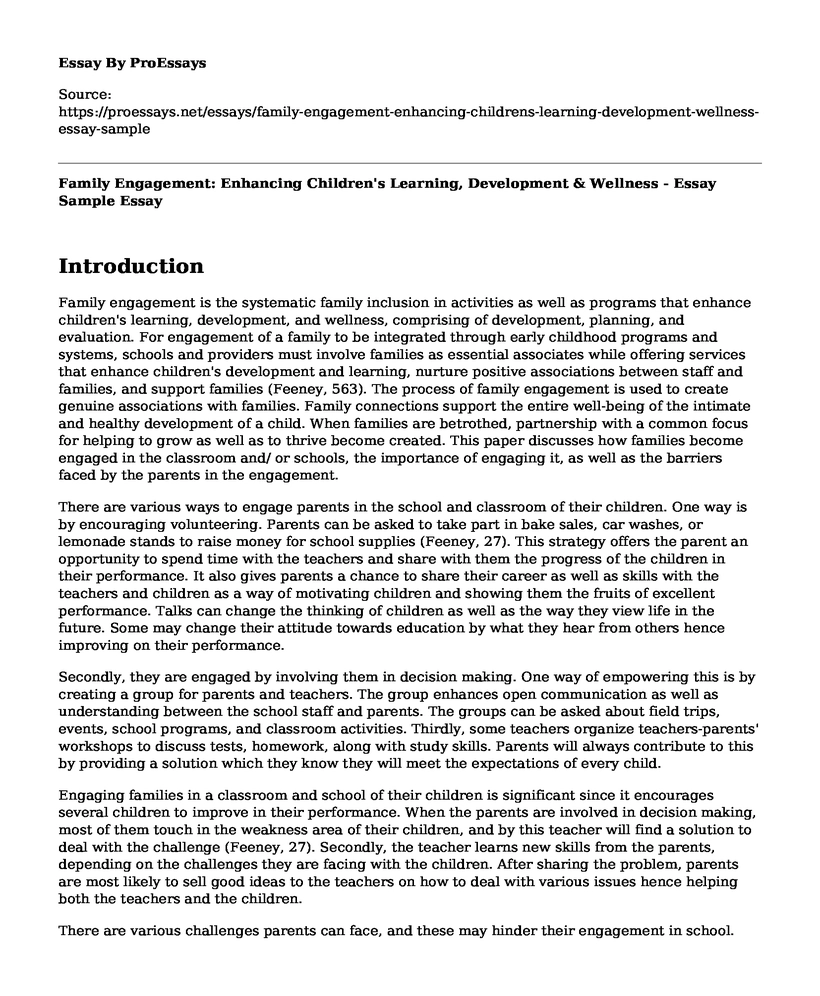Introduction
Family engagement is the systematic family inclusion in activities as well as programs that enhance children's learning, development, and wellness, comprising of development, planning, and evaluation. For engagement of a family to be integrated through early childhood programs and systems, schools and providers must involve families as essential associates while offering services that enhance children's development and learning, nurture positive associations between staff and families, and support families (Feeney, 563). The process of family engagement is used to create genuine associations with families. Family connections support the entire well-being of the intimate and healthy development of a child. When families are betrothed, partnership with a common focus for helping to grow as well as to thrive become created. This paper discusses how families become engaged in the classroom and/ or schools, the importance of engaging it, as well as the barriers faced by the parents in the engagement.
There are various ways to engage parents in the school and classroom of their children. One way is by encouraging volunteering. Parents can be asked to take part in bake sales, car washes, or lemonade stands to raise money for school supplies (Feeney, 27). This strategy offers the parent an opportunity to spend time with the teachers and share with them the progress of the children in their performance. It also gives parents a chance to share their career as well as skills with the teachers and children as a way of motivating children and showing them the fruits of excellent performance. Talks can change the thinking of children as well as the way they view life in the future. Some may change their attitude towards education by what they hear from others hence improving on their performance.
Secondly, they are engaged by involving them in decision making. One way of empowering this is by creating a group for parents and teachers. The group enhances open communication as well as understanding between the school staff and parents. The groups can be asked about field trips, events, school programs, and classroom activities. Thirdly, some teachers organize teachers-parents' workshops to discuss tests, homework, along with study skills. Parents will always contribute to this by providing a solution which they know they will meet the expectations of every child.
Engaging families in a classroom and school of their children is significant since it encourages several children to improve in their performance. When the parents are involved in decision making, most of them touch in the weakness area of their children, and by this teacher will find a solution to deal with the challenge (Feeney, 27). Secondly, the teacher learns new skills from the parents, depending on the challenges they are facing with the children. After sharing the problem, parents are most likely to sell good ideas to the teachers on how to deal with various issues hence helping both the teachers and the children.
There are various challenges parents can face, and these may hinder their engagement in school. There may be inadequate time management in school, and this may impair the parents who want to share their careers and skills with the children to lack humble time. It may hinder the parent from sharing fully what he or she has for the children hence discouraging them. Another challenge may be the language communication barrier, where some of the parents cannot use the language that is commonly used in school (Feeney, 563). Also, some may lack confidence in them, and they may not be able to share what they have with the teachers, even if it is beneficial. These challenges can be overcome by building confidence, being a good time manager, and improving on the language spoken in schools for proper communication.
Conclusion
In conclusion, engaging parents in the school or classroom of a child is essential. Many parents can handle their children in the right way when they are at home because of what they learn from teachers. It encourages sharing of the ideas between parents and teachers hence finding a solution to help the children. Family engagements lead to a strong association between parents and teachers.
Works Cited
Feeney, Stephanie et al. Who Am I In The Lives Of Children? 11th ed., Pearson Education, Inc., 2019, p. 563.Feeney, Stephanie et al. Who Am I In The Lives Of Children. 9th ed., Merrill, 2001, p. 27.
Cite this page
Family Engagement: Enhancing Children's Learning, Development & Wellness - Essay Sample. (2023, May 14). Retrieved from https://proessays.net/essays/family-engagement-enhancing-childrens-learning-development-wellness-essay-sample
If you are the original author of this essay and no longer wish to have it published on the ProEssays website, please click below to request its removal:
- Why Tattoos Are More Popular in Asia - Annotated Bibliography Example
- Paper Example on Factors Affecting Student Achievement
- Essay Sample on Virtual Museums
- Essay Example on Infant Development: Caregiver Interactions and Brain Development
- Essay Example on Homeschooling: Flexibility & Isolation Challenges
- Free Paper Sample on Graduating Students: Overcome Job Challenges
- Summary of Strengths - Essay Example







